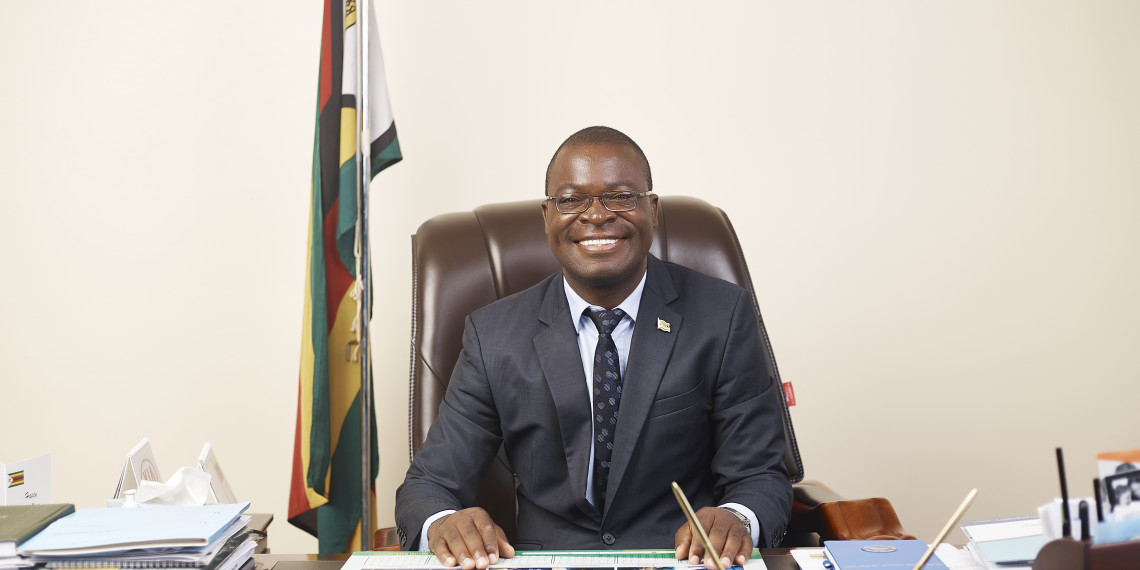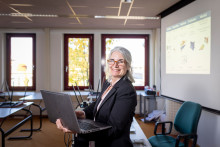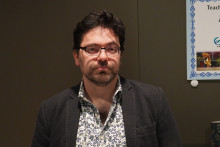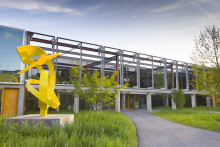Until 2017, Professor Murwira was a ‘regular’ scientist. Doing research in his lab, giving lectures and helping PhD candidates at the Department of Geography and Environmental Science of the University of Zimbabwe. Then a phone rang. ‘On the 13th of November, 2017,’ he remembers. ‘I was sitting at home and suddenly I got a phone call. They told me they had the list of new ministers and that my name was on it. It had never crossed my mind that I would be a minister. Never ever! So if you ask me how I became a minister, I have to answer: I don’t know! It was a great surprise. I didn’t do anything to deserve it.’
‘ITC taught me to be truly cosmopolitan’
As the professor puts it, somebody must have been looking at him while he wasn't looking at himself. A few weeks later after the unexpected phone call, the scientist took a national oath and became the Honorable Minister – a title that people in his office use frequently and a title that he is living up to. In the past one and half years, Amon Murwira has already transformed the world of science and education in his home country. ‘I can be a catalyst. Make sure other people’s lives can be better and exciting because of my contributions.’
'ITC taught me to be truly cosmopolitan'
Improving people’s lives is a motto Professor Murwira repeats many times. Perhaps because his own life has been changed by leaps and bounds. 'I grew up in a very rural area. And when we say "rural" in Zimbabwe, we really mean it,' he says. Surrounded by cows, chickens and donkeys on his long walks to school, he was worlds apart from the high-tech equipment of geo-information science. 'I was not thinking of becoming a scientist. I dreamt of doing my best at school, so I would have good opportunities in life.' This attitude has led him to a degree in geography at the University of Zimbabwe, and consequently to his studies at ITC in Enschede.
'I was exposed to geo-information science (GIS) very naturally, through my work as a staff development fellow in the Department of Geography and Environmental Science. A joint project with ITC allowed me to do my Master's in the Netherlands. I did very well and was able to start a PhD program immediately after.'
The professor looks back at his time at ITC with joy. 'It was a great international environment. It taught me to be truly cosmopolitan, to be a person that accepts everybody and is able to interact with anybody. Moreover, there was surely no deficit of resources. There was a lot of great equipment and very good teachers. It was a scientifically powerful environment. Really amazing.' Murwira's research results were similarly so. In 2003, he defended his doctoral thesis titled 'Scale matters', in which he explored a new method of using remote sensing to understand ecological landscapes. 'It was quite exciting,' he says. 'I'm still excited by it. It was in the top 10% of all PhD theses of that time.'
Back in Zimbabwe
Armed with GIS knowledge, the scientist returned to his home country. 'I was teaching GIS and remote sensing at the University of Zimbabwe, but it wasn't an easy time. The country was going through an economic crisis. Almost all my colleagues left because of the economic situation. But I stayed. I wanted to contribute the best I could.'
'We need to understand our planet in order to keep it sustainable'
In 2011, seven years after he started working at the university, Murwira became the Head of the Department of Geography and Environmental Science, a department that he decided to change to its core. 'I changed the entire curriculum. I worked together with ITC to provide trainings. I wanted us to become the center of excellence for GIS and remote sensing.' These efforts yielded results. 'The department grew enormously. When I arrived, we had only six computers. When I left there were labs that could accommodate 300 people. The interest in GIS is much bigger now in Zimbabwe. There were twenty students when I became the head of the department. Now the university has over 500 students!'
It is apparent that geo-information science and Earth observation is a field close to the minister's heart. 'GIS is very important because we need to understand our planet in order to keep it sustainable. This is the technology that can help us understand it intimately, it can help us to map resources and measure sustainable use of these resources, to manage our environment. This is the natural scientific field to ensure that we live on a good, green and sustainable Earth.' Environmental monitoring has been the focus of Murwira's scientific career. He's written over eighty publications and trained more than fifty PhD students. 'ITC gave me this ability,' he says. 'The ability to publish good papers in renowned journals. To become an international scientist.'
Amon Murwira
1970 Born in Nzuwa village in Gutu district (Zimbabwe)
1993 Bachelor degree in geography, University of Zimbabwe
1993 -1998 staff development fellow in the Department of Geography and Environmental Science
2000 Master degree in Environmental Systems Analysis and Monitoring, ITC (Faculty of Geo-information Science and Earth Observation)
2003 PhD degree in Geo-Information Science, ITC and the Wageningen University
2004 Lecturer at the University of Zimbabwe
2011 Head of the Department of Geography and Environmental Science, University of Zimbabwe
2016 Full professor
2017 Minister of Higher Education, Science and Technology Development
Remaking the system
Writing scientific papers is, however, something that Amon Murwira needs to put on hold for now. 'Being a minister is a lot of hard work,' he says. 'I never realized that.' The minister doesn't seem afraid of the challenge. Just like in his previous position, he has once again introduced significant changes - and this time on an even larger scale, influencing not one university but Zimbabwe's entire higher education, science and technology. He began with a skills audit at his ministry. 'The last one was done in 1981,' he points out. 'So the first thing I did was gathering my team to assess their skills. You need to know what you are capable of and what you need to work on.' On that note, the professor ordered a national audit. 'This showed that there is a deficit of technical skills. Zimbabwe is a very literate country, but we need to grow in science and technical abilities.'
'Zimbabwe needs to solve its own problems'
To ensure improvement, the minister turned his attention to the country's universities. 'I realized that many researchers in Zimbabwe did science for science’s sake. While at ITC I learnt to always focus on practical issues, on real problems. I realized our researchers needed to do more and talk less. So I essentially had to remake our whole educational system. I increased our focus on skills development and practical education.' Another issue the professor saw, was the infrastructure related to universities. And he decided to try something his predecessors never did. 'I involved the private sector. They can build the infrastructure, while the universities concentrate on their curriculum.' A lot of changes in a rather short period of time. 'Yes, indeed. But I have enjoyed a lot of support from the universities. I've been involving them since the beginning, made it a democratic process. This has been possible because I'd had the relationships already.'
As the minister, Amon Murwira also founded the Zimbabwe National Geo-Spatial and Space Agency. 'Zimbabwe needs to solve its own problems,' he replies when asked why he decided to do start this institute. 'And I see that many of our problems are related to a lack of practice and knowledge in GIS. For instance, we have rich mineral resources and we need a way to monitor them.'
'Our research should solve problems'
In essence, the professor wants to make sure that science and technology in Zimbabwe truly contribute to people's lives. 'We need education that produces social responsibility and ensures good life for our citizens. Basically, we want nice and intelligent people that do something for humanity,' he says with a smile. Because of that, he strongly believes that all research should serve the needs of the people. 'And our people need good life, good food, proper medicine to be healthy. The Dutch are good in water engineering. Why? Because water is a problem in the Netherlands. Research in the Netherlands is problem driven. We should do the same. We shouldn't do science for science’s sake. We shouldn't do things just because they are interesting. We should be interested in things that are useful. Our research should solve problems. And the number one problem in Zimbabwe is poverty. We need to eradicate poverty.'
Big challenges lie ahead, but Amon Murwira looks everything but discouraged. 'Mountains move for focus,' he repeats. ‘It’s possible to make life better. It’s not easy, but it’s possible. I'm happy to be alive during this exciting time. I'm excited that I can contribute to humanity. I didn't expect to be a minister. I didn't bring myself into politics, I was brought into it. I will see where life takes me next. I enjoy science and I would love to go back to research, but I am happy to do anything in life, as long as it helps people.'









